She Makes Confucius Cool Again Los Angles Times
All Photos by Jeffrey Wasserstrom
I've just returned from a trip to Mainland china that began with a week in Shanghai, where I participated in one literary festival, and ended with a few days in Beijing, where I had a pocket-sized role in another bookish consequence of the same kind. It was skilful to get back to those cities, which I've visited regularly since the mid-1980s, particularly since temperatures were higher and smog levels lower than I'd feared they might be, and the panels at Shanghai'due south M on the Bund and Beijing'due south Uppercase M went besides as I'd hoped they would. But as satisfying as returning to each city was, I was specially glad to be able to slip in a side trip to Qufu, a small city in Shandong Province, all-time known for its ties to Confucius, that I'd never been to before. This visit has inverse forever the way I think nearly the historical treatment of the ancient sage and how I think about a canonical modern Chinese text, Mao's Little Cerise Book.
I decided to go to Qufu, which is still dwelling to many members of the Kong lineage of which Confucius was office, as soon equally I realized how elementary it would exist to fold this place I'd long been curious to see into a rushed itinerary. Thanks to the opening of a new bullet train route, I could set off from Shanghai in the morning, get to Confucius's hometown afterward existence whisked along the rails for iii hours, spend the afternoon seeing the main local sights (the Confucius Temple, the Confucius Mansion, and the massive Kong family cemetery that includes the philosopher's tomb), and then continue on past rails to Beijing the same evening, getting to the capital 2 hours later.
Qufu had been high on my "to come across" list for years due to my interest in the dramatic about-confront the Chinese Communist Party has made regarding Confucius. He is now treated as a kind of national saint just, to borrow from sports writing parlance, his posthumous career has had the ups and downs of a classic improvement child. Most significantly, every bit Maura Cunningham and I note near the get-go of our China in the 21st Century: What Everyone Needs to Know (Oxford Academy Press, second edition, 2013), as recently as the 1970s he was "excoriated in a mass campaign that presented him every bit a man whose hide-bound, anti-egalitarian ideas had done nifty harm to many generations of Chinese men and even more impairment to generations of Chinese women." How, I wondered on the train to Qufu, would sites associated with Confucius deal with the various reversals of fortune that have been experienced past the sage, who was out of favor amongst intellectuals in the 1910s, simply to be exalted by Chiang Kai-shek in the 1930s, before being reviled throughout the Mao years (1949-1976) and so surging dorsum into official favor under the Chairman'south successors? In symbolic terms, might Qufu exist that about unusual sort of contemporary Chinese locale — a completely Mao-free zone?
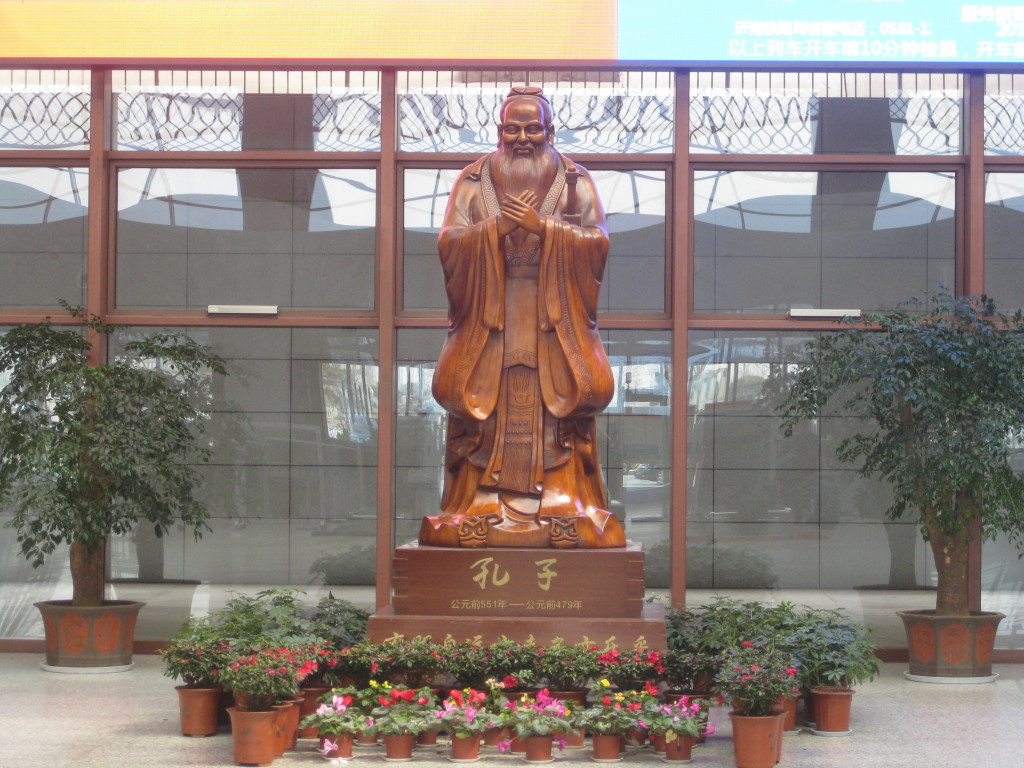
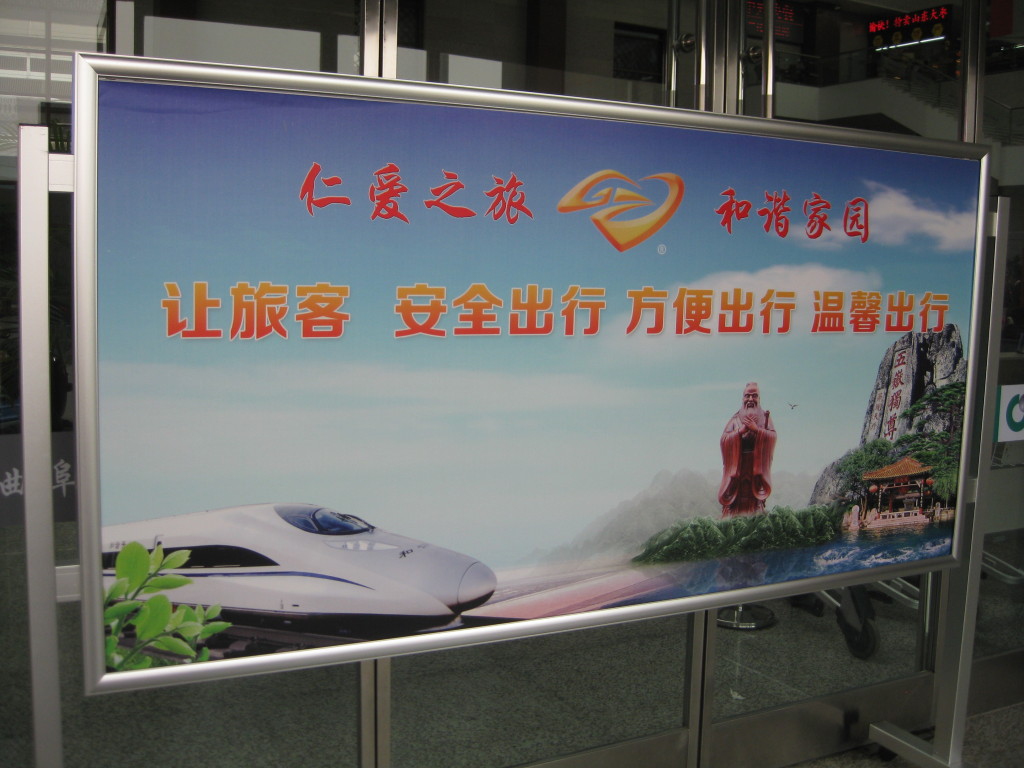
My showtime fifteen minutes in Qufu were frustrating ones. They were spent circumvoluted the train station with a friend, who was also shuttling between the Shanghai and Beijing literary festivals and had agreed to join me in some Confucius-themed sightseeing, trying to effigy out a way to leave our numberless in a prophylactic identify while venturing into the city. My initial impression, captured in a couple of photographs I took during breaks from our quest to notice lockers or a secure baggage room (the closest we got was a waitress pointing to a closet in her eatery that she thought might be a good identify to stow our bags), was of a city that was all virtually Confucius and had no room for Mao, and was unconcerned with the ups and downs of the former's career. Bigger than life in the station's master hall was a statue of Confucius that gazed down on all visitors and was described simply equally a revered figure from aboriginal times. And when I stepped exterior, I saw the same visage gazing down at me benevolently from a giant poster that placed Confucius between a needle-nosed bullet train (suggesting that Qufu is a place that honors venerable traditions just is part of a modern country) and a hillside (nodding to the urban center's but claim to fame unrelated to the Kong family, which is its proximity to Mountain Tai, a leading allure for Chinese lovers of nature).
Mao came into the picture, though, as soon as we gave upwardly on leaving our numberless at the station and decided to hire a taxi with a decent-sized locked trunk for the whole afternoon. Hanging from the cab driver'south rearview mirror was the aforementioned adept luck medallion emblazoned with the late Chairman's confront that i sees in taxis across Communist china. As he drove us to our first cease, the Confucius Temple, he pointed to rows of buildings going upwards along the highway and cranes in the altitude that were part of still grander development plans. Qufu, the voluble human insisted, was destined to get a major tourist site and a bigger urban center, since travelers from Korea, Japan and Taiwan too as from all parts of China would desire to come up and pay homage to Confucius. Was he sure, I asked, that the population and local tourist merchandise would grow enough to justify all the building underway? Definitely, he said, nodding his head vigorously, and then offered ii pieces of evidence to back upward his confidence. First, the Shangri-La luxury chain had recently opened a hotel in Qufu. Second, Chinese President Xi Jinping's wife, Peng Liyuan, had close ties to the area, so money was bound to flow into the region.
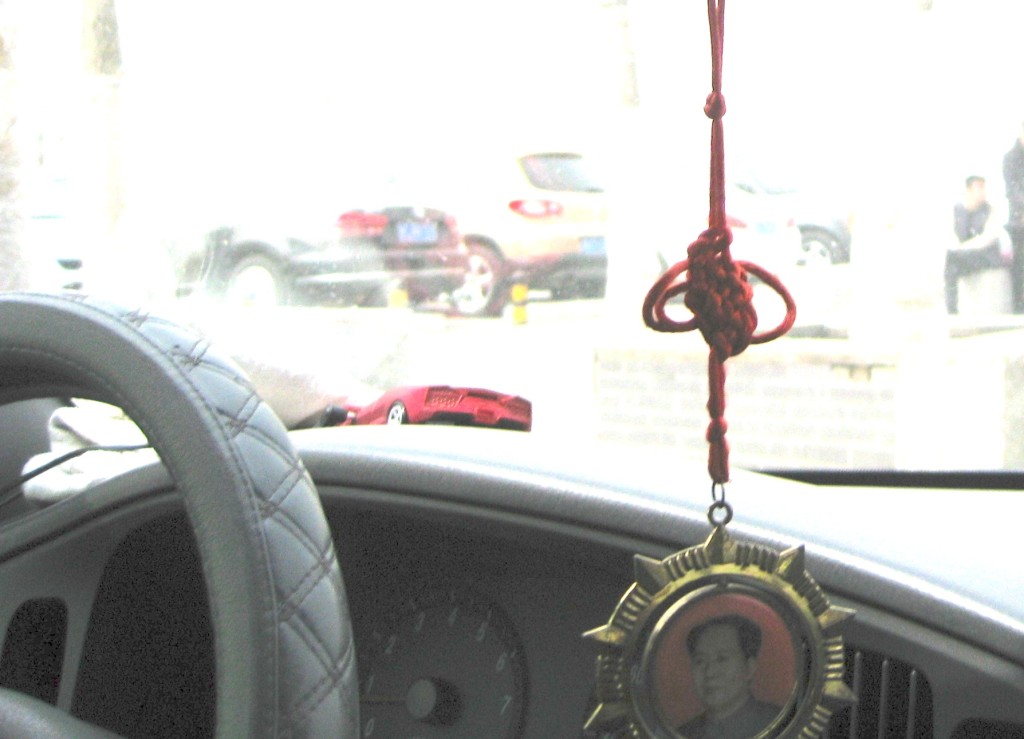
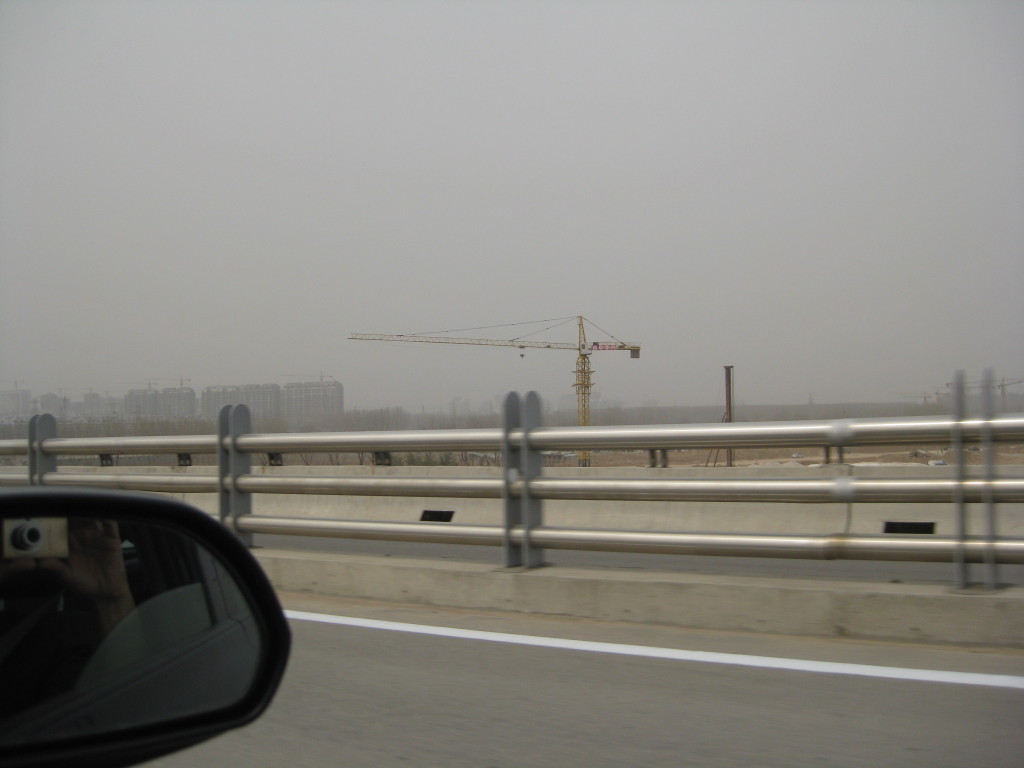
Responding to my other questions, he said that he wasn't part of the Kong lineage, to which an estimated 20% of the merely over half-a-million people living in the greater Qufu are said to vest, but he was a local. And as such, he was very proud to be from the aforementioned place every bit a dandy sage and hero of Chinese history.
I asked if he saw anything foreign well-nigh saying that while having an image of Mao in his car, since the Chairman, an iconoclast from an early age, had despised Confucius throughout his adult life. The driver only bellowed with laughter. I asked if he even knew nearly the anti-Confucius stance of Mao's day, and he nodded and, withal laughing, shouted out "Pi Lin, Pi Kong!" This is the shorthand for the most famous anti-Confucius campaign of all, which took place in the early 1970s. Making use of the term "pi" for criticize, it targeted both the aboriginal philosopher ("Pi Kong") and Mao's erstwhile heir credible, Lin Biao ("Pi Lin"). Lin, a People'southward Liberation Ground forces leader, had been seen as a devoted follower of Mao and staunch defender of Mao's estimation of Marxism and iconoclastic critical opinion toward Confucian ideas. When the tide turned against Lin, though, he was defendant of having been a secret supporter of all things reactionary, including Confucianism, which provided the tortured logic for a double-barreled "Anti-Confucius, Anti-Lin Biao Campaign," which threw alleged ancient and gimmicky enemies of the revolutionary cause into the same vile category.

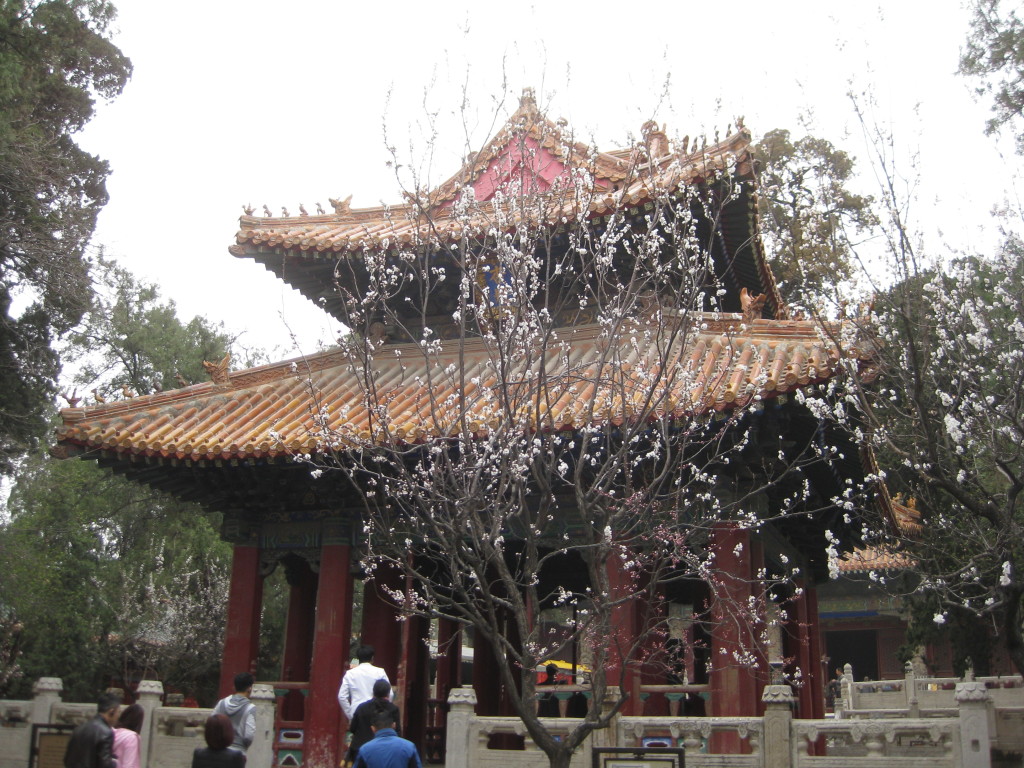
When we made our way through the city'due south 3 major sites, the primary focus of the texts aimed at tourists, from booklets to plaques, was simply the glories of Confucius and the rich legacy of the lineage to which he belonged and the imperial era he is ofttimes used to represent. In that location was not any mention, at least in whatever text I saw, of the fact that Confucius had only been revered during part of the People'south Democracy'south history.
Every now then, though, the recent past would come into view, since both some official gift shops and many of the unofficial booths selling trinkets near to the fundamental sites contained objects associated with Mao and his era in powers. Inside the Confucius Mansion, for example, there was a store selling various decks of cards: some featuring Confucius, others celebrating emperors, and even so others honoring Mao. Meanwhile, betwixt the Temple and the Mansion, there were unlike just equally promiscuous displays of statues, with Confucius, the Buddha, and Mao all jumbled together.
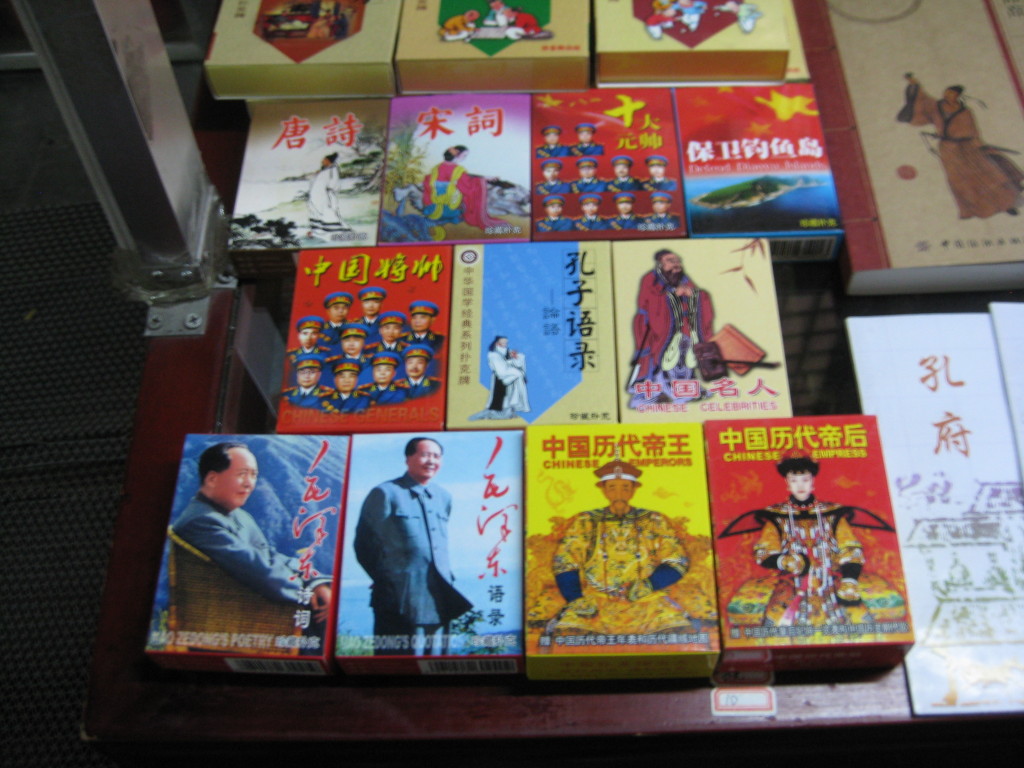
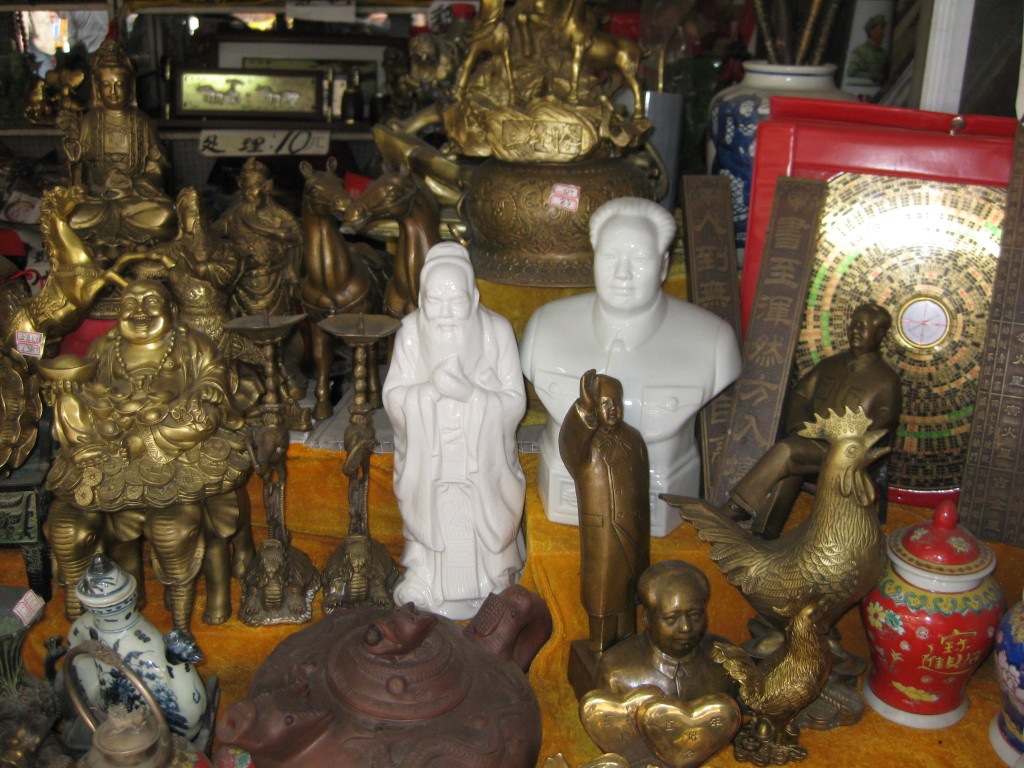
Of all the curious juxtapositions of objects, though, there'south one that stands out well-nigh to me equally I look back on my Qufu afternoon, which I spotted at a souvenir stall displaying, amidst other things, a lot of small books with red covers. A set of four cherry-red booklets in particular caught my eye. Two were differently packaged versions of the classic Little Red Books containing Mao'due south selected sayings; but the other two were similarly designed and titled copy-true cat texts, made up, in this case, of quotations by Confucius.
The side-by-side placement of Niggling Crimson Books associated with Mao and Confucius seemed curious for so many reasons that information technology is hard to know where to begin in attempting to unravel or even depict them. To try to sort them out, I spent some time on the plane ride domicile perusing an accelerate copy of Mao's Little Red Book: A Global History, a wonderful album edited by Alexander Melt that Cambridge University Press is publishing adjacent month. The chapters in the volume, by talented scholars based in unlike countries and different disciplines, explore everything from the manner the eponymous text was created and distributed within Communist china to the meanings it took on when it made its manner to strange countries such as Bharat, Italy, Albania and Peru.
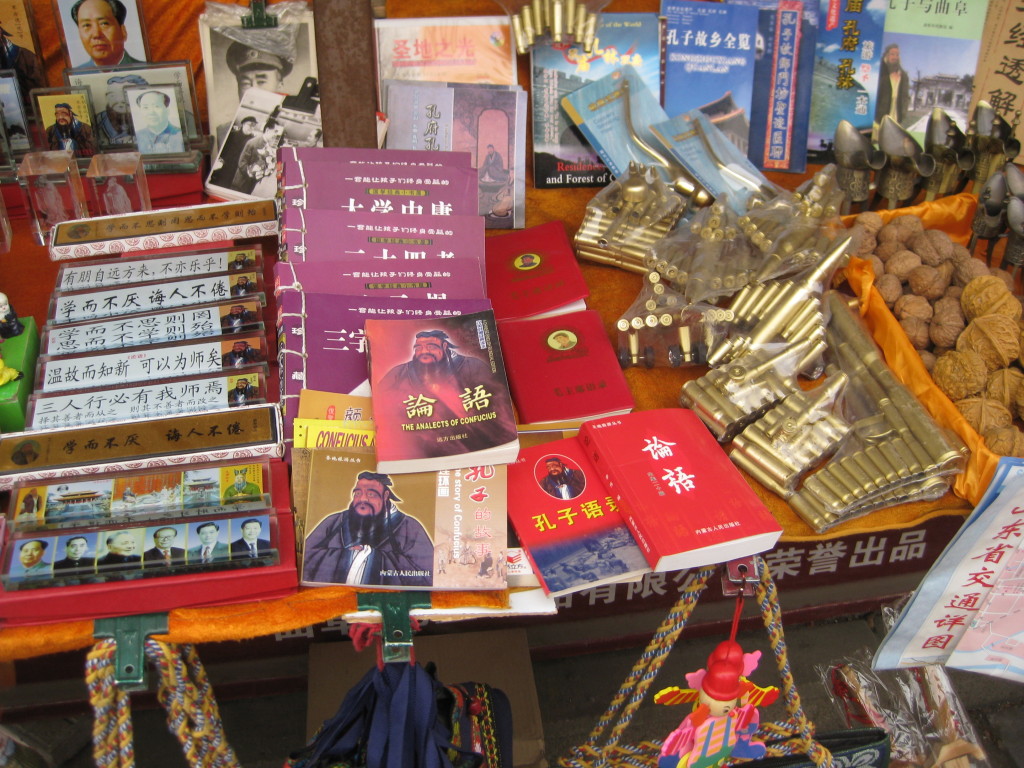
Here are two things the capacity by Melt and his collaborators propose might exist worth because while pondering the apparent contradiction of unlike sorts of little carmine books placed beside one another on that table in Qufu. Lin Biao, before being castigated equally a cupboard Confucian, took a special role in promoting Mao's Little Ruddy Book and wrote a preface to the best-known edition of it. And while the titles and even pattern features of the newly created Little Red Books of Confucian sayings imitate features of Mao-era creations (note the round images of the authors on some books), the original Little Ruby-red Books of quotes by Mao were themselves inspired in part by pamphlets and booklets from earlier times that brought together aphorisms from the Analects and other classical Chinese philosophical texts.
I thought that Qufu would exist the sort of place I'd only want to visit in one case, but the more I ponder what I've come to recall of equally my Little Red Books photograph, the more certain I am that I'll need to go back there again. I volition want to encounter if the cab driver's prediction of great things for the city comes truthful. I may fifty-fifty encounter what it's like to stay in a Shangri-La in Confucius's hometown. And I will definitely do something I foolishly forgot to do on my starting time visit: buy i of the re-create-cat Trivial Cherry-red Books that has a picture on its comprehend of, and words within by, a philosopher Mao thought of equally having ideas that were the polar opposite of his own.
* To acquire more about some of the topics brought up in this postal service, see the following three works:
1)Shades of Mao: The Posthumous Culture of the Keen Leader. Page 33 of this pathbreaking work edited past Geremie R. Barmé contains a word of a Confucian "Piddling Cherry-red Book" published in Qufu in the early 1980s; page 86 has a photograph of one.
ii)A Continuous Revolution–Making Sense of Cultural Revolution Culture. This book by Barbara Mittler, which recently won the American Historical Association's Fairbank Prize, has discusses connections between Confucian and Maoist texts and practices and has a proficient treatment of the Anti-Confucius, Anti-Lin Biao Campaign; see especially folio 193.
3) "To Protect and Preserve: Resisting the Destroy the Iv Olds Campaign, 1966-1967." This chapter by Dahpon David Ho inThe Chinese Cultural Revolution as History (a volume edited past Joseph West. Esherick, Paul Thousand. Pickowicz, and Andrew Thou. Walder) contains a fascinating and detailed account of Mao era activities in Qufu, including pitched battles between those trying to deface and those fighting to defend the Kong family cemetery.
Source: http://blog.lareviewofbooks.org/chinablog/confucius-mao-little-red-book/
0 Response to "She Makes Confucius Cool Again Los Angles Times"
Post a Comment